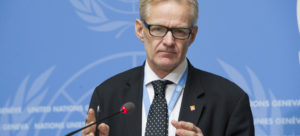 Jan Egeland, Senior Adviser to the UN Special Envoy for Syria, detailed in a statement to journalists in Geneva the “heart-wrenching” effect of the renewed violence in the governorates of Dera’a and neighbouring Quneitra.
Jan Egeland, Senior Adviser to the UN Special Envoy for Syria, detailed in a statement to journalists in Geneva the “heart-wrenching” effect of the renewed violence in the governorates of Dera’a and neighbouring Quneitra.
“The reports from our colleagues are that, even the extremely effective lifeline across the border from Jordan has been discontinued due to the fighting in recent days,” he said.
“Humanitarian actors have pre-positioned supplies inside Dera’a and inside Quneitra, however, movement is very difficult and humanitarian operations are paralyzed in too many areas.”
Until recently, civilians in the area had been to some extent protected from fighting by a de-escalation agreement signed last year by Russia, Iran and Turkey.
This had provided a “rare area of sanctuary and protection”, Egeland said.
Already in response to an upsurge in hostilities amid a Government-backed assault on opposition-held areas in the southwest, an estimated 45,000 to 50,000 people have been displaced.
After emerging from a scheduled meeting of a humanitarian taskforce at the UN, Egeland stressed the dangers of all-out fighting in a region where there are an estimated 750,000 civilians.
Many had already been displaced by previous hostilities, he added, before making a direct plea to Jordan to continue assisting war-weary Syrians.
“Our appeal goes to Jordan, one of the most generous recipient of refugees on earth, that they keep borders open for people fleeing south,” he said. “There is no other place to go”.
Egeland also took the opportunity to emphasize the need for an immediate cessation of hostilities. “It would take too long to negotiate a ceasefire,” he explained, before calling on countries with “influence” on the situation to halt hostilities, as happened with a lifesaving ceasefire in 2017.
“We urge…again, the Russians, the Americans, the Jordanians were able to do it last July, they can do it again today,” Egeland added, insisting that there was “nothing inevitable about this escalation of fighting…There are many more babies than there are so-called terrorist fighters in the zone and the children have the right of protection against attacks”.
Turning to Idlib in the northwest, Egeland described the situation as one of “extreme concern”.
Of the 900,000 people who have been displaced inside Syria since the start of the year, 500,000 have fled to Idlib, he added.
Delivering aid to the massive influx of people has been complicated by ongoing violence linked to armed groups who are vying for control, the UN Senior Adviser explained.
“All of these armed groups that have come there and who are in opposition to each other – and who also have been difficult to humanitarian actors – are exacerbating the problems of this being the largest collection of internal displacement camp on earth.”
